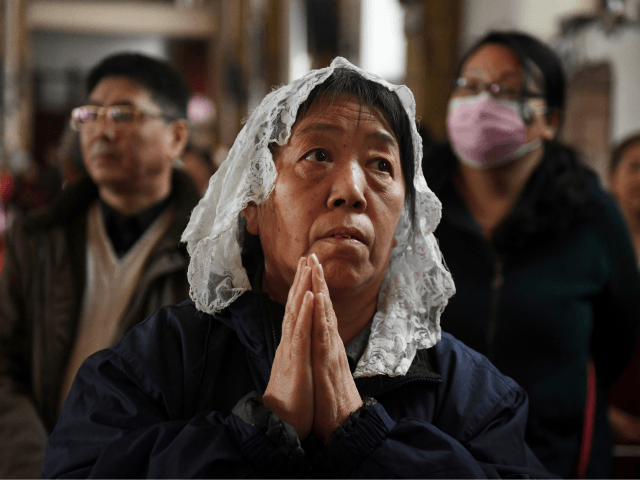A new U.S. government report states that the persecution of Catholics has worsened in China since the Vatican signed a provisional deal with the Communist Party regarding the naming of bishops.
On Wednesday, the bipartisan Congressional-Executive Commission on China (CECC) released its annual report on human rights conditions and rule of law developments in China, which reveals an overall deterioration of religious liberty in China over the year 2019.
“In September 2018, the Chinese Ministry of Foreign Affairs signed an agreement with the Holy See, paving the way for the unification of state-sanctioned and underground Catholic communities,” the report states. “Subsequently, local Chinese authorities subjected Catholic believers in China to increased persecution by demolishing churches, removing crosses, and continuing to detain underground clergy.”
“The Party-led Catholic national religious organizations also published a plan to ‘sinicize’ Catholicism in China,” the report continues, referring to the stated aim of the Chinese Communist Party (CCP) of forcing all religions to conform their teachings and practices to the party line.
Chinese Communist Party General Secretary Xi Jinping has doubled down on the “sinicization” of religion, the report’s executive summary notes. “Scholars and international rights groups have described religious persecution in China over the last year to be of an intensity not seen since the Cultural Revolution,” it adds.
While a representative of the Holy See stated that the aim of the agreement was “for Chinese Catholic believers to have bishops recognized by both the Holy See and Chinese authorities,” the report also says that “observers noted that the Chinese government was likely seeking to increase its control over the underground community.”
In point of fact, China has cracked down on the underground church ever since the Holy See has softened its position on the state-controlled Catholic Patriotic Association, allowing believers to join despite its assertion of total independence from Rome.
“Although the terms of the agreement were not made public, a source familiar with the negotiations stated that the agreement gave the Chinese government the authority to nominate bishops, which the Pope would retain the right to veto,” the report continues. “The Holy See also recognized seven formerly excommunicated official bishops as part of the deal, having already asked two underground bishops to give up their positions to make way for two of these state-sanctioned bishops.”
The report concludes that the situation of Catholics in China is now worse than it was before the Vatican signed its 2018 accord with the CCP.
“Observers and Catholic believers expressed concern that the agreement did not provide sufficient support for the Chinese Catholic community, with one scholar pointing out that the authorities’ persecution of both underground and official Catholic communities has actually intensified over the last year under the ‘‘sinicization’’ campaign,” it reads, before noting that in the spring of 2019, authorities detained three underground priests of Xuanhua diocese in Hebei province.
As bad as conditions in China were for Catholics and other Christians in 2019, they are destined to be even worse in 2020.
The CCP has announced a series of draconian administrative measures for religious groups, which will go into effect on February 1, 2020, bringing them even more completely under government control.
Religious organizations must henceforth “spread the principles and policies of the Chinese Communist Party” by educating “religious staff and religious citizens to support the leadership of the Chinese Communist Party,” reported AsiaNews, the official press agency of the Pontifical Institute for Foreign Missions.
All religious activities or rallies and even programs of religious communities must have the approval of the Religious Affairs Office, as the new measures seek to complete the “regulations on religious affairs” that went into effect on February 1, 2018.
The government’s religious affairs department will assume absolute control over religious groups and “should perform their functions such as guiding and supervising the groups’ operation,” reports stated.
More broadly, the new regulations “stipulate how the groups should designate their officials, carry out their work and manage their own affairs,” the report stated.
In addition to tightening control over all community activities, the new measures will require religious personnel to actively promote submission to the Chinese Communist Party among all members of their communities.
Religious organizations “must adhere to the leadership of the Chinese Communist Party, observe the constitution, laws, regulations, ordinances and policies, adhere to the principle of independence and self-government, adhere to the directives on religions in China, implementing the values of socialism,” declares Art. 5 of the regulations.
Furthermore, all religious organizations “must spread the principles and policies of the Chinese Communist Party, as well as national laws, regulations, rules to religious personnel and religious citizens, educating religious personnel and religious citizens to support the leadership of the Chinese Communist Party, supporting the socialist system, adhering to and following the path of socialism with Chinese characteristics,” reads Art. 17.

COMMENTS
Please let us know if you're having issues with commenting.